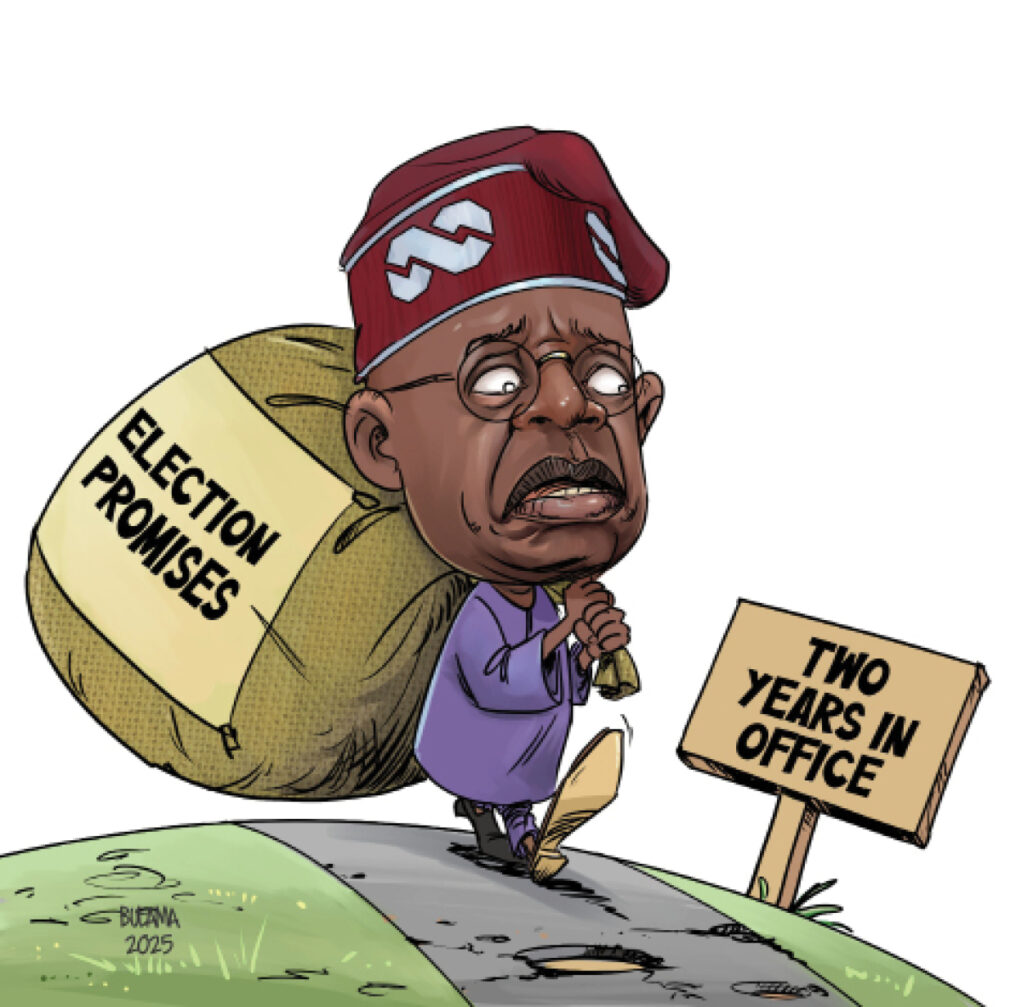[ad_1]
Experts and stakeholders across key sectors in Nigeria, including security, economy, and agriculture, have called on President Bola Ahmed Tinubu to use the midpoint of his administration to reassess ongoing policies and take concrete steps to deliver tangible benefits to Nigerians.
Since his inauguration on May 29, 2023, President Tinubu’s economic reforms—particularly the removal of fuel subsidies and the unification of the foreign exchange market—have been hailed by institutions such as the World Bank and International Monetary Fund. However, critics argue these policies have led to widespread hardship, pushing more Nigerians into poverty and worsening the country’s fragile security situation.
The federal government has repeatedly highlighted what it called key milestones, including a significant increase in government revenue, as evidence that its economic realignment is working. It said funds have been channelled into large-scale infrastructure projects such as the Lagos-Calabar Coastal Highway and the Sokoto-Badagry Superhighway. Oil production has reportedly risen to 1.61 million barrels per day, with over $500 million in foreign direct investments secured. A Compressed Natural Gas (CNG) initiative, Tinubu said, is expected to save over N2 trillion monthly by cutting petrol imports.
SPONSOR AD
Social intervention programmes have also been rolled out. These include N95.6 billion approved for the Student Loan Scheme, over N200 billion allocated to the newly established Consumer Credit Corporation, and N570 billion disbursed to states for livelihood support. Other highlights are a new national minimum wage of N70,000, increased NYSC allowances from N33,000 to N77,000, and tariff waivers on food and pharmaceutical imports.
Despite these, experts argue that the gap between policy intent and experiences of Nigerians remains wide. Headline and food inflation, as well as heightened insecurity across states and the FCT, have become the realities of most Nigerians, according to several surveys, including the one by the National Bureau of Statistics’ Crime Experience and Security Perception Survey (CESPS) for 2024.
In the security sector, Dr. Kabir Adamu, CEO of Beacon Security & Intelligence Ltd, noted that while the government cites operational successes against terrorists, bandits, and kidnappers, with thousands killed or arrested, data reveal a troubling rise in abductions and violent attacks nationwide. He warned that federal efforts would remain fragile without stronger local policing, functional state-level security architecture, and progress on long-delayed initiatives like state police and local government autonomy.
Adamu commended presidential directives such as the recruitment of 129,000 forest guards but stressed that national security would remain rhetorical unless top-level reforms translate into community-level impact. “What Nigeria needs is a comprehensive, community-driven, and well-funded security strategy,” he said.
Commenting on the economic fallout from subsidy removal, an expert in economics, Dr. Vincent Nwanma, urged the government to prioritise investments in social infrastructure and restore public trust. “Unless this is done in the coming year, the legacy of these reforms may be remembered more for hardship than progress,” he said.
In agriculture, stakeholders lamented food insecurity despite the administration’s support programmes. Kabiru Ibrahim, president of the All Farmers Association of Nigeria (AFAN), said insecurity, climate change, and low mechanisation continue to undermine food production, often forcing the government to resort to temporary import windows, as seen between July and December 2024.
He said, “Ordinarily, we should see an increasing availability of food, but due to many inhibitors like insecurity, climate change, and low mechanisation, we are still experiencing gaps that sometimes necessitate windows of import, such as what we had between July and December 2024.
“We hope things will change shortly because of the several windows of support and the increased effort in the fight against insecurity.”
Michael Adedotun Oke, a project facilitator at Talent Upgrade Global Concept, called on the government to develop robust agricultural value chains beyond primary production. Similarly, Fatima Sale, a doctoral student in agriculture, stressed the need for a transparent and well-coordinated policy that sustainably supports smallholder farmers.
On the political front, analysts expressed concern over early 2027 campaign activities, urging the president to prioritise governance. They urged President Tinubu to focus on governance in the remaining months of his first term, saying delivering tangible results is paramount. They stressed that verifiable improvements in citizens’ lives remain the most effective campaign strategy, not what they called a crackdown on opposition voices or the pursuit of a one-party state agenda.
Do you want to share a story with us? Do you want to advertise with us? Do you need publicity for a product, service, or event? Contact us on WhatsApp +2348183319097 Email: platformtimes@gmail.com
We are committed to impactful investigative journalism for human interest and social justice. Your donation will help us tell more stories. Kindly donate any amount HERE




